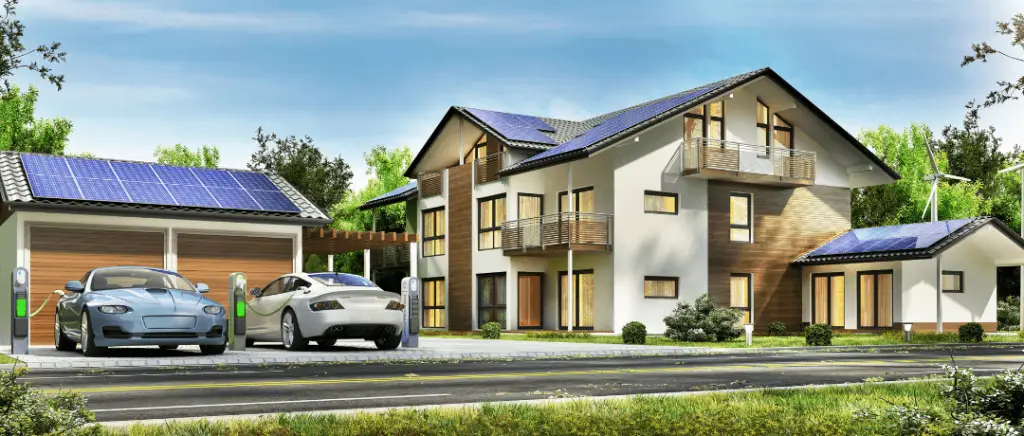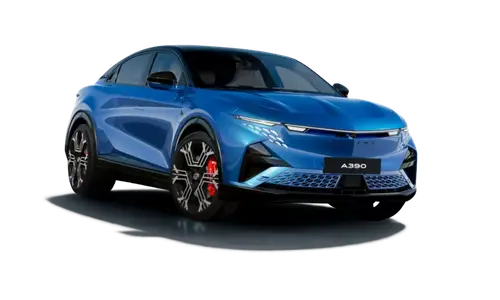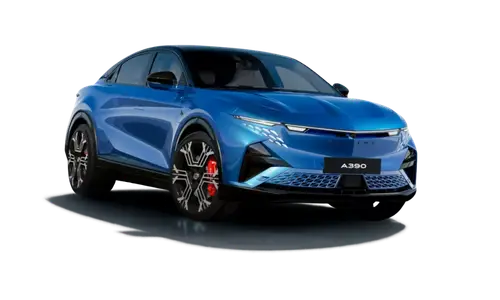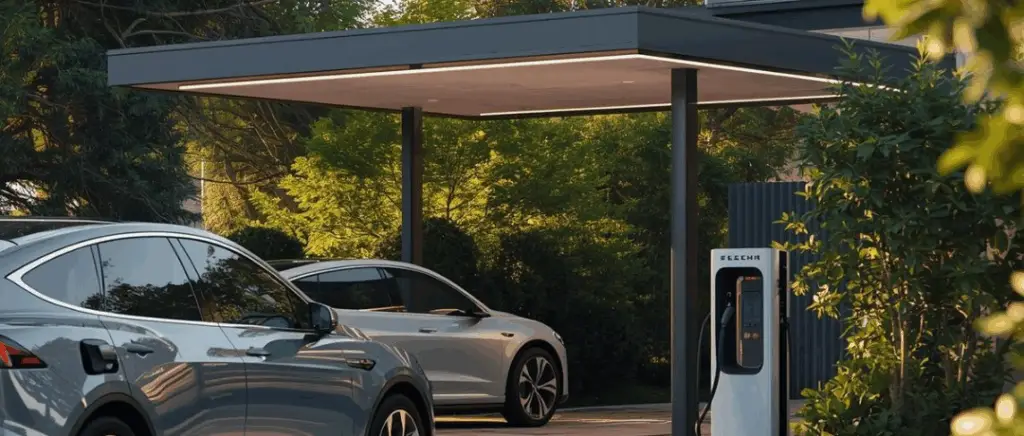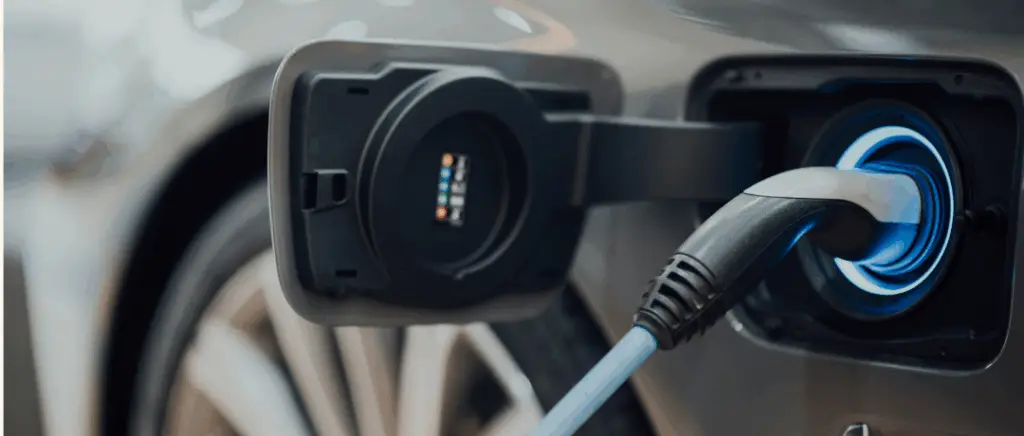Why not install photovoltaic solar panels?
With Beev, get a turnkey solar panel solution to reduce your electricity consumption.
What are solar panels?
As the name suggests, solar panels harness the sun's energy, energy from the sun. Respectful of the environment, they produce and store this energy, which is then transformed into electricity thanks to photovoltaic technology. You can then use it to power your electric car, allowing you to be both user and producer of clean energy.
What are its advantages?
The use of photovoltaic panels to recharge electric cars is one of the most effective ways of reducing energy consumption. a promising alternative to traditional energy sources. The combination of a photovoltaic solar panel and a recharging solution for electric vehicles offers a number of advantages, and represents a major step forward in terms of energy efficiency. an economical and ecological solution for the production and use of solar energy.
From an economic point of view
La average annual energy consumption for a household is around 4,500 kWh. Adding the charging requirements of an electric car increases this consumption. So charging your own electric car increases your annual electricity bill.
The use of solar panels to charge the car may be a sensible option, although it is not always easy to find a solution. home recharging of an electric vehicle is still generally more economical that :
- on public terminals,
- or a petrol vehicle.
Read also : Comparison between electric and internal combustion cars
As for the solar panels, further reduce the cost of recharging and ensure a certain autonomy. Installing these types of panels means significant energy savings. Thanks to self-consumption, locally-generated green electricity is used, reducing dependence on the grid and energy purchases.
If the installation is eligible, the resale of unused energy is possible. The rates are set quarterly by the State for this purpose, helping to reduce energy bills. As a result, photovoltaic installations are more profitable. To give you an idea, surplus electricity from a solar array of 9 kWp or less is bought back at a rate of €0.10 per kWh.
However, the costs of a photovoltaic installation are as follows:
- purchasing costs,
- installation costs,
- the cost of repairing the photovoltaic system.
Nevertheless, it should be noted that these expenditure in question is more predictable than fluctuations in energy pricesespecially in times of inflation. It is also estimated that a solar installation pays for itself in around 10 years.
From an ecological point of view
Choosing an electric car is in itself an ecological act. It is estimated that in France, one an electric car emits 2 to 3 times less greenhouse gases than a combustion engine car over its entire lifetime. However, the growth of these vehicles is naturally increasing our demand for electricity. This has led to the realisation that some sources of electricity are less polluting than others, particularly solar energy.
The use of solar panels to generate electricity represents a an environmentally-friendly alternative to fossil fuelsThis avoids the use of electricity from non-renewable fuels. What's more, the resale of the surplus contributes to the production and supply of clean energy.
What's more, the almost all solar panels can be recycled. The recovery percentage varies between 85 and 95 % depending on their composition. For example, glass, the main component of solar panels, is infinitely recyclable.
All in all, choosing to recharge your electric car using solar panels is an excellent way to save money. an ecological gesture with a double impact !
For more information on this subject, please consult our white paper "Photovoltaic panels for dummies"
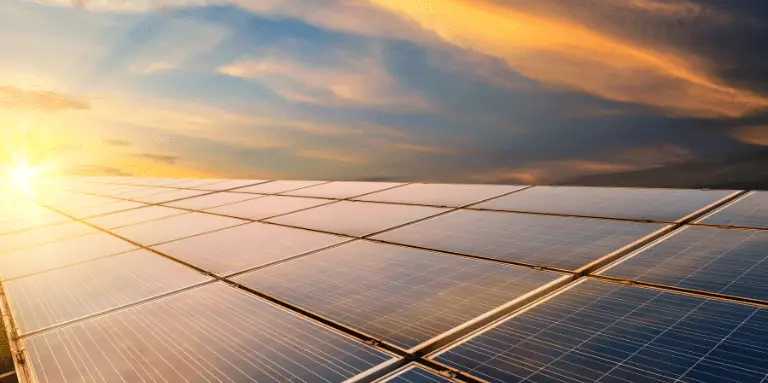
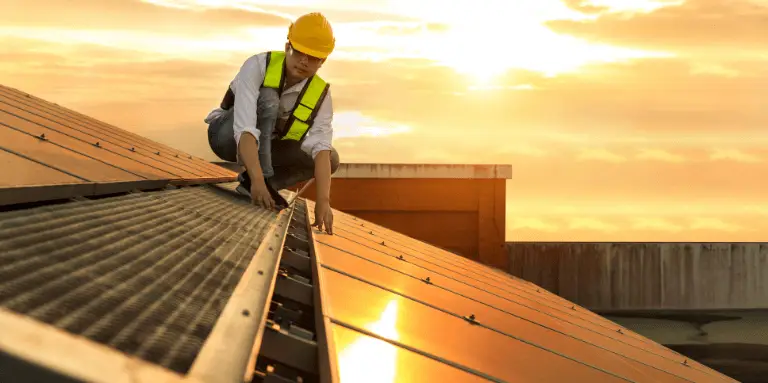
Where should solar panels be installed?
Note that a electric car consumes an average of 3,500 kWh per yearor nearly 80 % of the consumption of a French household4,500 kWh on average, as previously stated.
This makes installing solar panels an attractive option. So choosing the ideal location for your solar panels is crucial to maximising their efficiency and making the most of your investment.
On the roof of your home
Roofs are increasingly being fitted with solar panels. They generally offer large open spaceThey can be found on both industrial buildings and detached houses. They can be found on both industrial buildings and detached houses, which partly explains why they are so popular. growing popularity. This versatility means that surplus energy can be stored or sold back to the electricity supplier.
However, it is important to check the orientation and pitch of the roof before embarking on a solar project. Although south-facing with a 30° tilt is recommended, other configurations are also possible.
By opting for this alternative, your solar panels will be able to supply electricity from the sun.electricity to your home and battery of your vehicle. In addition, it will be possible tosupply a storage battery so that you can reuse this electricity at a later date, for example to recharge your car at night.
Installing a solar carport
A solar carport (or photovoltaic shade) is a type of covered structure with photovoltaic panels on the roof and is designed for parking and recharging vehicles. The carport in question has a inverter solar or micro-inverter converting the direct current generated by the panels into alternating current. This type of current is used to recharge cars and other electrical appliances.
This means installing a specific shelter for charging your electric car. What's more, it protects your vehicle from the elements and is easy to install. This solution is often adopted by those without a garage, offering a practical way of recharging their vehicle.
These carports generally accommodate one or two cars in private homes, but can also accommodate more in car parks. Some models have a surface area of up to 40 m².
To optimise the charging of your electric car, it is best to take advantage of theideal sunshineThis is often in the afternoon, as with traditional solar panels.
Read also : Mandatory photovoltaic shading for car parks: a measure to promote the energy transition
Other locations for solar panels
There are an increasing number of options for installing solar panels at home, if you prefer to avoid altering your roof. The options available include :
- solar roof tiles,
- the solar pergola,
- ground-mounted solar panels.
What you need to know A 100 m² house occupied by a family of 3 or 4 people requires between 8 and 10 solar panels, or around 3 kWp (kilowatt-peak). With enough sunshine, this installation could be enough to power the car for a week, taking into account the French national average of 30 km per person per day.
How many panels do you need for electric recharging?
The number of solar panels required will vary from one home/car park to another, depending on the following factors:
- The composition of your household,
- The surface area of your roof,
- The total budget to be allocated to this investment,
- The battery capacity of your electric car,
- The power of the solar panels you select.
What you need to know Optimum production is achieved when the sun shines on your home, facing south and at an angle of 30°. With the wrong orientation, you'll need more panels to achieve the desired energy levels.
And if you want to estimate your energy needs, follow these guidelines:
- Find out about your electric car's consumption in kilowatt-hours per kilometre.
- Multiply this figure by the average distance you travel every day.
- Divide the total by the maximum number of hours of sunshine in your region.
This will give you the ideal output of your solar array in kilowatts. You can then divide this result by the kilowatt-hour efficiency of your solar panels to determine the number of panels you need.
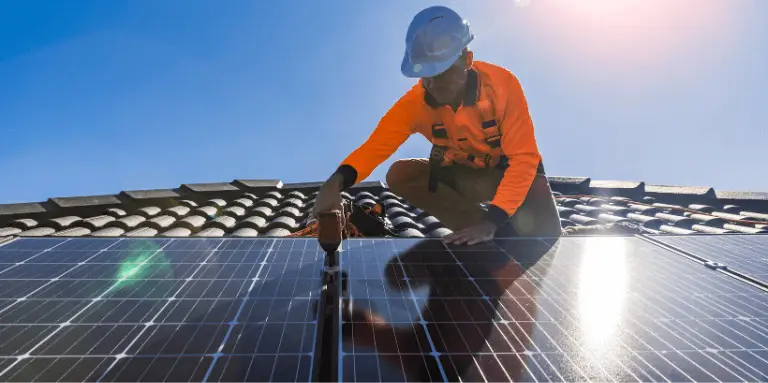
What price should we expect for the installation of solar panels?
First of all, of course, you need a charging point if you haven't already done so. Prices range from €500 to €2,000 for wall-mounted bollards, depending on :
- The bollard model,
- Geographical location,
- The complexity of the installation,
- The electrical power of the terminal,
- The distance between the electrical panel and the terminal (cable length).
That's why, Beev offers a selection of recharging solutions to meet all kinds of needs. Don't hesitate to contact our experts so that they can help you with your choice. home terminal installation or if you wish to equip your business with a recharging point.
Secondly, the cost of the installation of solar panels varies from region to region, but also depends on a number of factors:
- Integration into the building,
- Installed capacity,
- The complexity of the installation,
- The presence of self-consumption,
- Connection to the electricity grid.
Prices are generally as follows:
| PUISSANCE INSTALLÉE | COÛT DE LA POSE |
|---|---|
|
3 kWp
|
9000 €
|
|
6 kWp
|
15 000 €
|
|
9 kWp
|
20 000 €
|
As a third step, you can take a solar kitThe main factors influencing the price are the power installed and the location of the installation. The first price starts at around €1,600 and can rise to €10,000 depending on the power required.
This kit provides you with :
- Solar equipment,
- Electrical distribution and protection systems,
- Support or frame for solar panels on the roof,
- Electrical equipment for recharging electric cars.
Good to know : Calling on RGE-certified experts (Reconnu Garant de l'Environnement) and holder of the QualiPV label is essential for the installation of solar panels. Introduced in 2011, this label aims to ensure the expertise of companies involved in energy renovation projects.
Support for installing solar panels
Installing solar panels on your electric car represents a significant investment. Fortunately, there are a number of grants and subsidies available to help you finance your project and make it more affordable.
The self-consumption bonus
The government has introduced a self-consumption bonus to help households finance the installation of solar panels. This aid is only available to those who opt for self-consumption with sale of the surplus (and not total sale).
From now on, it will be paid in a single instalment at the time of the first billing, and this premium will vary according to the power of the installation. What's more, this financial assistance, which is adjusted according to the power installed, is gradually reduced.
Aid for local authorities
You can receive aid offered by municipalities, départements, intercommunal bodies and regions. To check whether there is any local authority support in your area, please contact your local council.
However, Article 13 of the Tariff Order states that : "Producers may not combine premiums and tariffs [...] for the same installation with any other public financial support for electricity production from a local, regional, national or European Union aid scheme".
Reduced-rate VAT
If the power of your photovoltaic solar panels is less than or equal to 3 kWpyou will benefit from a reduction in the VAT at 10 % instead of 20 %.
This reduced VAT will automatically be included in the estimate provided by the RGE-qualified professional.
The obligation to buy
By using the compulsory purchase system, private individuals have the opportunity toinject electricity into the grid and sell it at a regulated tariff. This practice guarantees a satisfactory return on investment over the lifetime of the facilities.
La the duration of the purchase contract is 20 yearsprovided that the installation is completed within 24 months of the complete request for connection, during which time the remuneration is determined.
Finally, private photovoltaic producers are free to sell all or part of the electricity they generate. Feed-in tariffs are set by decree and are subject to quarterly adjustments on the website photovoltaique.info.
However, it is important to note that this purchase contract cannot be combined with any aid offered by local authorities or with the self-consumption bonus.
Tax credit (for the charging point)
Electric vehicle owners are entitled to a tax credit, covering 75 % of the cost of purchasing and installing a home charging point. Since the beginning of 2024, the subsidy has been capped at €500 per charging point and per household, and is available to everyone, regardless of income level.
Conclusion
Installing solar panels on an electric car has a number of advantages for both private individuals and professionals. This technology makes it possible to reducecarbon footprintThis will increase the vehicle's range and save money on electricity bills.
However, it is important to note that the development of this technology is still in progress and that a number of challenges still need to be overcome. The high cost of solar panels and their limited efficiency in low sunlight conditions are obstacles to the widespread adoption of this technology.
Despite these challenges, the future of solar panels for electric cars looks promising. Technological advances, proven profitability and falling costs should all contribute to the democratisation of this technology in the years to come.
